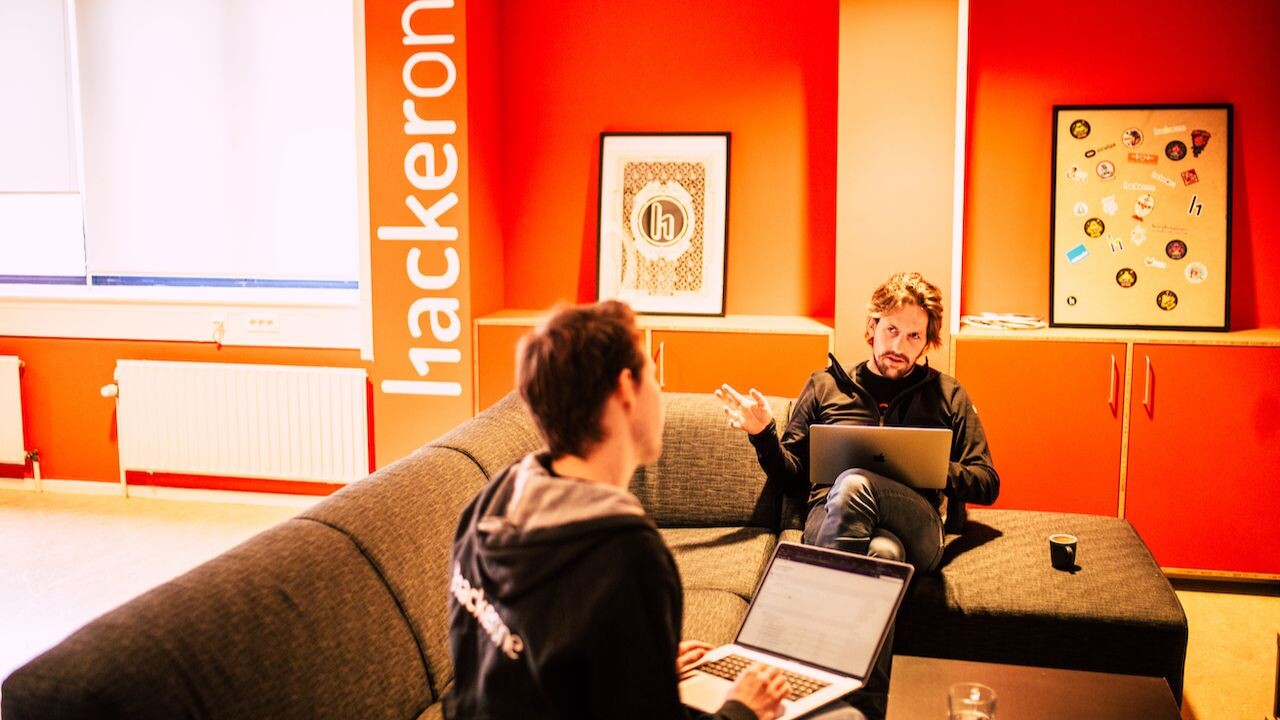
Photo by Stella Dekker Fotografie
In 2012, two former students from Hanze University of Applied Sciences in the Northern Dutch city of Groningen, took a major gamble. They made a list of 100 companies they’d like to work for — including Facebook, Twitter, Spotify, and Uber — and hacked them. As you can imagine, this little stunt certainly got their attention.
Now, $159.4M in investment later, their cybersecurity company, HackerOne, reached unicorn status in 2022 and counts big players like Nintendo, AT&T, Hyatt, GM, and even the Pentagon amongst its clients.
HackerOne is a bug bounty hunting platform that enables companies to enlist the help of ethical hackers across the globe to identify and mitigate security vulnerabilities and data breaches, which cost companies an average of $4.35 million.
While founders Jobert Abma and Michiel Prins now live in San Francisco, where HackerOne’s HQ is based, they surprisingly decided not to move their development team across the pond. In fact, over 50% of their engineering and product design team are still based in Groningen today.
The question is, does it actually make sense to keep half of your dev team in another time zone and is this a strategy other founders should actually consider? And why Groningen? With a global tech powerhouse like Amsterdam just a few hours away, why keep the team in this Northern Dutch city?
Follow-the-sun model
The story of HackerOne’s founders is the typical tech fairytale come true. Abma and Prins grew up across the street from each other in a small town in the North of the Netherlands and spent their time playing video games, building websites, and, of course, pulling the occasional prank hack.
They went to Hanze University of Applied Sciences in Groningen together, where they identified a major data leak in the institution’s system. Realizing this could be a successful business venture, they started a consultancy firm and built a small team of like-minded ethical hackers.
After gaining the attention of Silicon Valley’s biggest names, they realized it was time to spread their wings abroad.

At the same time, keeping part of their dev team in Groningen presented a great opportunity to introduce a ‘follow-the-sun’ model, ensuring someone is always online and ready to tackle any issues that arise.
“The internet has no borders,” Abma says, “We have tens of thousands of people every single day that use our platform to collaborate and work together. We rely on such a distributed community of hackers, that I don’t see why we can’t do that as a company.”
Indeed, HackerOne facilitates this exchange between global, ethical hackers and companies by providing a platform where they can connect, without having to worry about tax forms, background checks, payment security, and other barriers.
Some who visited fell in love with the city and moved permanently.
While there are a number of benefits to having a distributed development team, it also comes with its challenges.
“Working across time zones requires everyone to become good at written and asynchronous communication. It’s important to let people take time to become good written communicators,” Abma says.
Another important point he shared is to make sure engineering and adjacent roles continue to be regularly exposed to other departments, such as sales, marketing, and customer success. This helps build context, breaks down silos, and allows teams to create better solutions.
One way HackerOne does this is by sending their Groningen team to visit the San Francisco HQ a few times a year and vice versa.
It’s important to enable people to build a stronger bond by having them spend time with each other in person, at least twice a year. They love that aspect of having a distributed team because they get to visit different cities and meet new people, but still have the comfort of being able to live in Groningen, which I think is a great city to live in and raise a family.
The benefits of a cosmopolitan city, on a smaller scale
Aside from the business benefits of maintaining a distributed team model, as Abma explained, most of the team simply wasn’t keen to follow them to San Francisco.
“Many people were starting their families and had significant others there, so they couldn’t move to the other side of the world, and we didn’t necessarily want them to.”
For a city of just 235,000, Groningen has an extremely cosmopolitan vibe. Through its two universities and growing startup community, it attracts almost 6,000 international students per year and a growing number of expats.
Some HackerOne employees who visited the Groningen office from San Francisco fell in love with the city and decided to move there permanently. Abma suspects it’s these ‘expat ambassadors’ turned hiring managers who have been key to getting more global talent on board by sharing their first hand experiences of moving to the city.
I think it’s good for Groningen to just be Groningen.
For Isuru Ranaweera, Senior Software Engineer at HackerOne, moving his family to Groningen was an easy transition.
“What I enjoy about Groningen is that it’s less busy and I actually find it a calm city compared to other places. Additionally, I feel safer here, making it a good place to raise my child. Another bonus is that the city is very green, with plenty of trees.”

Another great policy HackerOne has in place is that they pay developers in Groningen the same rates they would pay in Amsterdam.
As an expat, settling here was easier compared to my friends who have settled elsewhere in the Netherlands. Housing is available and affordable, which I found beneficial when migrating to a different country. Reducing costs is important and living here helped me to lower my housing costs during my first years of residency. The commute is also easy as you don’t really need a car. We’ve been living here with a child and a dog without having a need for a car, which is great. I also like staying away from the chaos of big cities.
Having a base in a university town also has the added benefit of access to a pool of young talent. Groningen in particular has two great universities located in the city that attract students from across the globe. Zahra Putri Fitrianti, Software Engineer at HackerOne, was recruited after studying and working at the University of Groningen as a teaching assistant.
Personally, I really like the atmosphere in the city, it’s very suitable for students as well as workers. The city has a sense of tranquility that helps me be productive at university and work. There’s also a lot of great hubs where you can work, such as the Forum cultural center that provides great support for people that spend their day there, albeit sometimes being quite crowded especially during exam season.

Groningen is changing, but hopefully not too much
Groningen is quickly becoming a more recognizable name in the global tech community with new startup success stories and university spinoffs putting its ecosystem on the map. Nonetheless, there are a few changes Abma still hopes to see that will help the city reach its potential:
For Groningen to really upscale that vibrant ecosystem, there are some fundamental building blocks that still need to be built, like more access to funding, tax breaks, etc. What would make me really proud is if, ten years from now, some of the people who we initially hired at HackerOne went on to found their own companies in Groningen. If they can make that transition, it would show the building blocks are really in place. Although I’m happy to see companies like HackerOne have a presence there, I’d like to see more of that.
However, having lived both in Groningen and now (arguably) the capital of the tech world, Abma hopes these oncoming changes don’t impact the character of the city:
“I think it’s good for Groningen to just be Groningen. It doesn’t need to be the next Silicon Valley. There are a lot of downsides to that kind of ecosystem as well.”

The question is, like HackerOne, will Groningen’s humble beginnings morph it into a tech giant of the future? Probably not. But it will likely be a place of choice for expats and young talent looking for the perfect balance of exciting opportunities and compact city life. Unlike Silicon Valley’s cut throat culture, Groningen’s tight knit tech community can be likened to the theme song from Cheers: it’s likely everybody will know your name and actually be happy that you came.
If Groningen has piqued your interest, check out some of the great tech jobs open in the city on the Make it in the North.nl job board.
Get the TNW newsletter
Get the most important tech news in your inbox each week.






